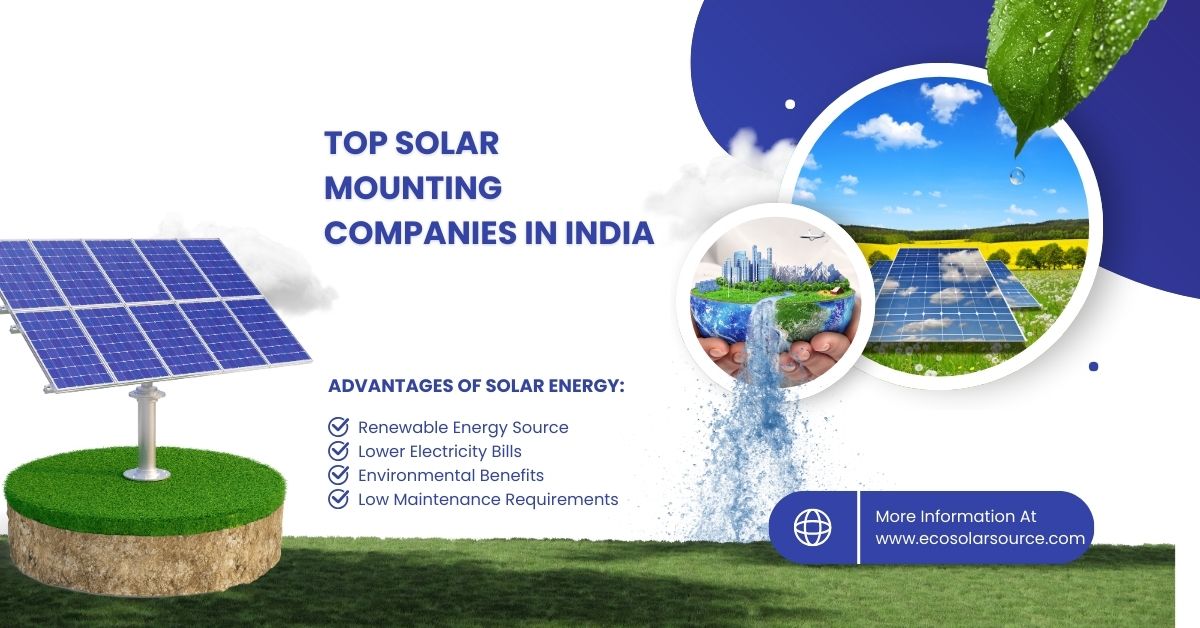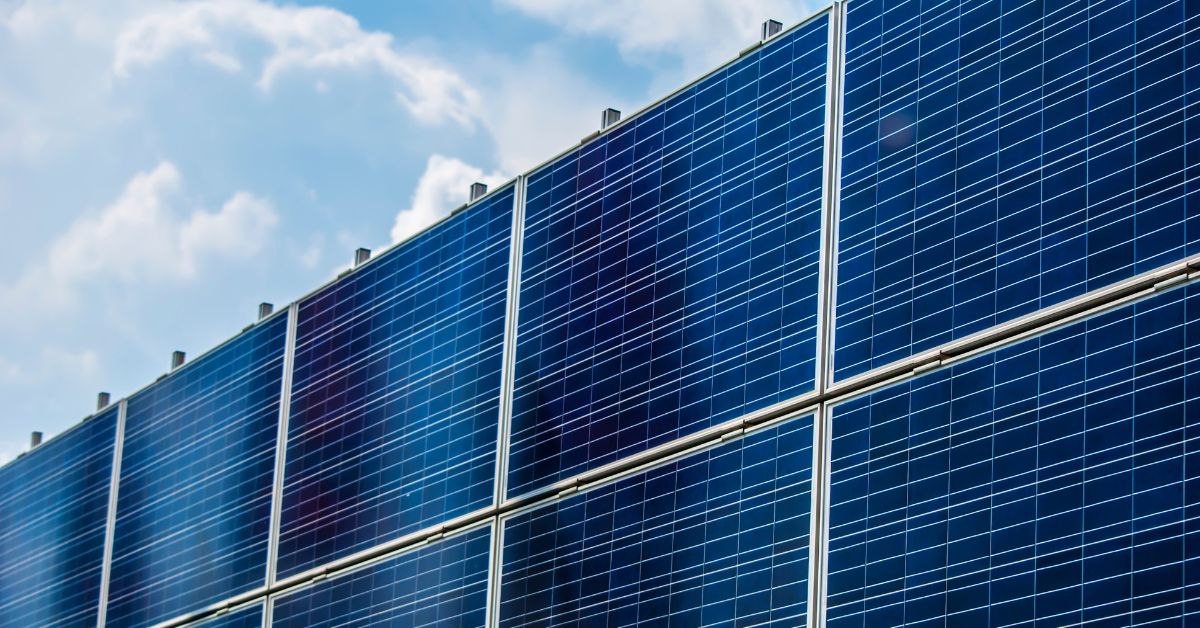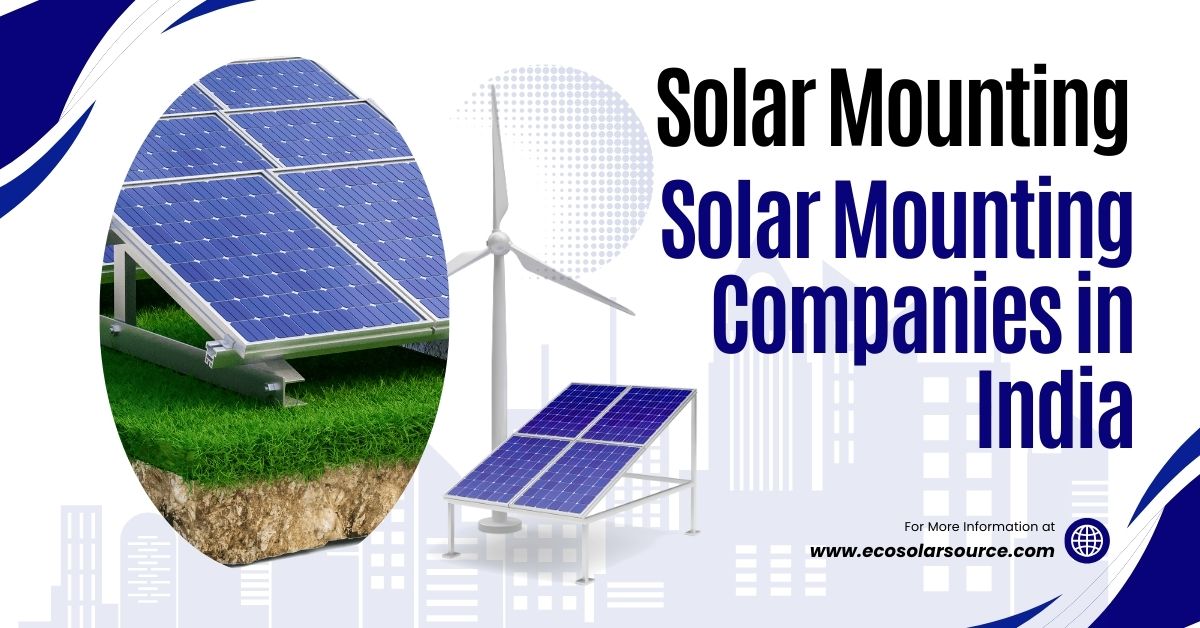Solar Mounting Companies in India
Solar mounting companies in India specialize in designing and installing robust, efficient structures to support solar panels for residential, commercial, and utility-scale projects. They provide customized solutions, including rooftop, ground-mounted, and floating solar systems, tailored to diverse environments and geographic conditions.
These companies prioritize sustainability, using durable, weather-resistant materials that maximize energy capture and system longevity. With India’s growing solar energy market, solar mounting companies play a critical role in accelerating the adoption of renewable energy by offering innovative, cost-effective installation solutions, ensuring optimal panel positioning, and enhancing overall system performance while complying with local regulations and safety standards.
Table of Contents
Solar Mounting Companies in India: Revolutionizing Renewable Energy Solutions
India is experiencing a revolution in renewable energy, with solar power at the forefront of this transformation. As the country grapples with growing energy needs and environmental challenges, solar power has emerged as a vital solution. A critical component of the solar energy ecosystem is solar mounting systems, which provide the structural foundation for solar panels to be securely installed on rooftops, ground, or specialized platforms. Solar mounting companies make solar installations efficient, safe, and scalable.
In this comprehensive blog post, we will dive into the key players, the innovations they bring, and the broader impact of solar mounting companies in India. These firms are shaping the future of renewable energy while contributing to the country’s ambitious goal of achieving 450 GW of renewable energy capacity by 2030. This article is broken down into the following of sections:
Overview of the Solar Industry in India
India’s solar power journey has been nothing short of extraordinary. The country’s large geographical expanse, abundant sunlight, and supportive policy environment have made it one of the fastest-growing solar markets globally. Solar power capacity in India has reached over 70 GW as of 2023, with expectations to rise dramatically in the coming decade. This boom in solar power capacity is fueled by increasing demand for clean energy, growing awareness of environmental sustainability, and favorable government incentives such as subsidies and tax breaks for solar projects.
The Indian government’s push for renewable energy through the National Solar Mission and state-level policies has set the stage for rapid expansion. Given India’s vast population and the need for clean energy, solar power presents a promising solution for both energy generation and employment creation.
In this burgeoning solar market, solar mounting companies play a critical role in ensuring efficient and secure installation of solar panels. Solar panels need durable and adaptable mounting solutions to harness the sun’s energy effectively, whether it’s for residential rooftops, commercial buildings, or large-scale solar farms.
Importance of Solar Mounting Systems
Solar mounting systems are the backbone of solar panel installations. These systems ensure that the solar panels are held in place, optimally angled towards the sun, and capable of withstanding wind, rain, and other environmental factors. Choosing the right mounting system is crucial for maximizing energy output and maintaining the longevity of the solar panel setup.
Mounting systems generally consist of three main types:
- Roof Mounting Systems: Used for installing solar panels on residential or commercial rooftops. These systems vary based on the type of roof – flat, sloped, or metal – and the space available.
- Ground Mounting Systems: Suitable for large-scale solar farms, these systems are installed directly on the ground, often with tracking capabilities to follow the sun’s path for enhanced efficiency.
- Floating Mounting Systems: A more recent innovation, these systems involve installing solar panels on water bodies such as reservoirs or lakes.
Mounting systems ensure that solar panels remain fixed and aligned at the correct tilt to maximize solar irradiation. Beyond that, they also contribute to minimizing shading, enabling airflow for cooling, and ensuring the longevity of the panels. The importance of high-quality mounting structures cannot be understated – a robust system guarantees the durability and safety of the entire solar array.
Top Solar Mounting Companies in India
Several companies in India specialize in the design, manufacture, and installation of solar mounting systems. These firms offer a wide range of solutions tailored to specific project requirements. Here’s a look at some of the top solar mounting companies in the country:

1) Ganges Internationale Pvt. Ltd.
Ganges Internationale is a leading player in the solar mounting industry in India. The company provides high-quality solar mounting structures for ground-mounted solar power plants and rooftop installations. Their offerings are known for being cost-effective, durable, and customizable, catering to both small and large-scale projects. They also export solar structures to various countries, making them a key player in the global market.
2) Sleek Solar Mounting Systems Pvt. Ltd.
Sleek Solar Mounting Systems specializes in developing innovative and lightweight solar mounting solutions, ideal for rooftop solar installations. The company emphasizes quality and flexibility in design, ensuring quick and hassle-free installation. With a strong emphasis on customer service and support, they have established themselves as a reliable partner for many solar projects across India.
3) Jindal Steel and Power Ltd. (JSPL)
JSPL, one of India’s largest steel producers, has ventured into the solar mounting structure space with its steel fabrication expertise. The company offers a range of solar mounting solutions, including ground-mount and rooftop structures. JSPL’s large-scale production capabilities ensure that they can meet the growing demand for solar mounting solutions across India.
4) Metalkraft Forming Industries Pvt. Ltd.
Metalkraft Forming Industries focuses on engineering precision in the solar mounting domain. Their solutions are designed to ensure minimal material wastage while offering maximum structural strength. The company provides mounting structures for both ground-mounted and rooftop solar projects. Their focus on reducing carbon footprints aligns with the broader renewable energy mission of India.
5) Waaree Energies
Waaree Energies, one of the largest solar panel manufacturers in India, also offers a range of solar mounting systems. Their solar mounting solutions are known for their durability and flexibility, catering to both residential and commercial projects. Waaree provides end-to-end solar solutions, including panel installation, which makes them a one-stop solution for solar needs.
Types of Solar Mounting Structures
The choice of a solar mounting structure largely depends on the location and type of solar project. Here’s an overview of the main types of solar mounting systems used in India:
1) Roof Mounting Systems
Roof-mounted solar systems are the most common for residential and small commercial buildings. These systems can be installed on flat roofs, sloped roofs, and metal roofs. There are two types of roof mounting systems:
- Fixed Tilt Mounting: In this setup, the panels are installed at a fixed angle to maximize exposure to the sun during peak hours. The angle depends on the geographic location to ensure optimal energy production.
- Ballasted Mounting: For flat roofs where drilling may not be preferred, ballasted mounts use weights to keep the system in place. This minimizes any damage to the rooftop while ensuring stability.
2) Ground Mounting Systems
Ground mounting systems are ideal for larger installations like solar farms and commercial projects. These systems are mounted directly onto the ground and can be used in areas where rooftop space is unavailable. The types of ground mounting systems include:
- Fixed Ground Mounts: These structures are installed at a fixed angle and orientation to the sun. They are often more affordable but less efficient than tracking systems.
- Tracking Systems: A more advanced type of ground mount, tracking systems move the solar panels throughout the day to follow the sun’s path. There are single-axis and dual-axis tracking systems, with the latter being more efficient but also more expensive.
3) Carport Solar Mounting Systems
Carport solar mounting systems are designed to combine the benefits of a parking structure with solar energy generation. These systems are installed above parking spaces and can provide shade to parked vehicles while generating clean energy.
4) Floating Mounting Systems
Floating solar installations are emerging as an innovative solution to land scarcity in densely populated areas. These systems are installed on water bodies such as lakes, reservoirs, or ponds. Floating solar installations reduce evaporation, prevent algae growth, and maximize the use of available space.
Innovations in Solar Mounting Technology
As the solar industry evolves, solar mounting companies are innovating to provide more efficient, sustainable, and cost-effective solutions. Here are some of the latest innovations in solar mounting systems:

1) Pre-assembled Mounting Systems
Pre-assembled mounting systems are designed for quick and easy installation, reducing labor costs and installation time. These systems come with pre-configured components, allowing for rapid deployment, especially in large-scale solar farms.
2) Bifacial Solar Panel Mounting Solutions
Bifacial solar panels generate electricity from both sides of the panel, capturing sunlight reflected from the ground or other surfaces. This technology increases the efficiency of solar systems, and companies are developing specialized mounting structures to support these panels. These mounting systems are designed to optimize the reflective surface area, maximizing energy production.
3) Lightweight and Flexible Mounting Structures
With the increasing adoption of rooftop solar systems, companies are focusing on developing lightweight and flexible mounting solutions. These systems are particularly useful for older buildings with weaker roof structures that may not support heavy loads.
4) Tracking Mounts with AI Integration
Tracking mounts have evolved to include artificial intelligence (AI) for better performance. These systems adjust the solar panel angle dynamically, based on real-time weather conditions and sunlight intensity, ensuring maximum energy output. AI-integrated systems can also predict potential issues and provide maintenance recommendations, optimizing the overall efficiency of solar power generation.
Challenges Faced by Solar Mounting Companies
While the solar mounting industry in India is growing rapidly, there are still several challenges that these companies face:
1) Cost Competitiveness
One of the biggest challenges is maintaining cost competitiveness while ensuring quality. Many solar projects in India operate on tight budgets, and mounting companies must strike a balance between affordability and durability. Lower-cost solutions often compromise on material quality, which can affect the lifespan of the installation.
2) Regulatory Barriers
Navigating the regulatory landscape in India can be challenging. The lack of uniform building codes and installation guidelines across states creates barriers for solar mounting companies. Additionally, obtaining permits and approvals can slow down the implementation of solar projects, especially in the rooftop segment.
3) Land and Space Constraints
In urban areas, land and space constraints pose a significant challenge for ground-mounted and rooftop installations. The high cost of land and the unavailability of open spaces often limit the scope of solar projects, particularly for large-scale solar farms.
4) Climate and Environmental Factors
India’s diverse climate conditions—ranging from extreme heat to heavy monsoons—demand that mounting structures be built to withstand harsh weather. Designing systems that are durable enough to survive high wind speeds, flooding, and corrosion due to moisture is a challenge that companies constantly address.
5) Competition from Imported Solutions
The Indian market is highly competitive, with several international players offering cheaper alternatives to local mounting solutions. Imported solutions, particularly from China, often undercut domestic manufacturers, creating pricing pressures for Indian companies.
Future Outlook for Solar Mounting Companies
The future for solar mounting companies in India looks promising, with several key trends expected to drive the industry forward:

1) Increased Demand for Rooftop Solar
The government’s push towards decentralized solar energy and rooftop installations in both urban and rural areas is expected to create substantial demand for rooftop solar mounting systems. This will particularly benefit small and medium-sized enterprises offering lightweight and customizable mounting solutions.
2) Growth in Solar Farms
As India continues to expand its solar power capacity, large-scale solar farms will continue to dominate the market. Ground mounting systems and advanced tracking solutions will be in high demand as developers aim to maximize the efficiency of these solar farms.
3) Innovation and Automation
Automation and innovation in mounting structures will continue to improve efficiency and reduce costs. Pre-assembled systems, AI-enabled tracking mounts, and modular designs will simplify the installation process and enhance overall energy output. As technology advances, the cost of these innovations is likely to decrease, making them more accessible to a broader market.
4) Sustainability and Environmental Concerns
As sustainability becomes a central theme in India’s development plans, there will be increased emphasis on environmentally friendly mounting solutions. Companies focusing on sustainable materials and reducing the carbon footprint of their production processes will find a competitive advantage in the future.
FAQs About Solar Mounting Companies in India
Q1. What are solar mounting systems, and why are they important for solar power installations?
Solar mounting systems are structures that support solar panels, ensuring they are securely positioned at the right angle to capture sunlight efficiently. They play a critical role in maximizing energy generation and ensuring the longevity and safety of the solar installation.
Q2. What types of solar mounting systems are commonly used in India?
In India, popular solar mounting systems include ground-mounted, rooftop-mounted (flat or slanted), and floating solar mounting systems, depending on the terrain, space availability, and project requirements.
Q3. What should I look for when choosing a solar mounting company in India?
Key factors include the company’s experience in Indian conditions, quality of materials (such as corrosion resistance), certifications, compliance with local regulations, warranties, and installation expertise.
Q4. Are solar mounting systems compatible with different types of rooftops in India?
Yes, solar mounting systems can be designed to fit various types of rooftops, including concrete, metal, and asbestos. Custom mounting solutions are often used for uneven or slanted roofs.
Q5. How do solar mounting companies handle extreme weather conditions like monsoons or high temperatures?
Reputable solar mounting companies use corrosion-resistant materials (such as aluminum or galvanized steel) and design structures to withstand high winds, heavy rainfall, and intense heat, ensuring durability in India’s diverse climates.
Q6. Are there government incentives or subsidies for solar mounting systems in India?
Yes, several central and state-level government incentives and subsidies are available for solar installations, including the cost of mounting systems. It’s best to check with the company’s knowledge of local schemes like the Ministry of New and Renewable Energy (MNRE) subsidies.
Q7. What is the typical lifespan of a solar mounting system in India?
With proper installation and high-quality materials, solar mounting systems in India can last 25–30 years or more, matching the lifespan of solar panels themselves.
Q8. How do solar mounting companies ensure the structural safety of installations, particularly on high-rise buildings?
Solar mounting companies conduct detailed site assessments and engineering analyses to ensure that the mounting systems are securely anchored and can handle the wind load and building structure, especially for high-rise installations.
Q9. Is maintenance required for solar mounting systems?
Solar mounting systems require minimal maintenance, though periodic inspections may be necessary to check for wear, especially after severe weather conditions. Cleaning of the panels may be necessary, but the mounting structure generally remains low-maintenance.
Q10. How much does a solar mounting system typically cost in India?
The cost depends on several factors, including the type of mounting system (ground vs. rooftop), materials used, installation complexity, and the size of the solar project. Generally, mounting systems account for 10-20% of the total solar installation cost.
Conclusion: Solar Mounting Companies and India’s Green Future
Solar mounting companies in India are crucial to the country’s ambitious renewable energy goals. By providing the structural backbone for solar installations, these firms ensure that solar panels can harness the sun’s energy effectively and efficiently. With innovation at the forefront, solar mounting companies are developing more efficient, cost-effective, and durable systems that can cater to both small-scale rooftop projects and massive solar farms.
India’s renewable energy future is bright, and solar mounting companies will play a pivotal role in driving the transition to a cleaner, more sustainable energy system. As the country moves closer to achieving its renewable energy targets, solar mounting companies will continue to innovate and grow, contributing to a greener and more prosperous future for India.
Click here to learn more about Solar Mounting Companies in India

